Manjit was awarded a Queen’s Police Medal (QPM) in the birthday honours list in 2020. She was nominated for being a “role model” and “truly inspiring officer in policing.
Reflections from Charnwood
Cailin-Jo Tyler
Firefighter, Shepshed and Eastern Fire Station
“I loved reading Ladybird Books with my grandmother when I was growing up.
We are now called firefighters which helps with inclusivity. We wear very different fire kit than in the books. It’s improved to help protect us from contaminants from fire. The fire trucks have also been upgraded and have a lots of new kit to help us work quicker. We now have hose reels which we usually fight fires with and the big red fire hoses are only used in very big fires or to help get water from fire hydrants.
Today there are a minimum of 4 firefighters and a maximum of 6 on a fire truck. We carry whistles and still have walkie talkies which we use to communicate with each other but we don’t carry axes anymore.
Our calls are varied. Aside from fires we attend road traffic collisions, assist ambulances, attend rail incidents where trains have derailed, airplane incidents, rescues from height, animal rescues, hazardous materials etc. We do many jobs that the public don’t necessarily expect us to do, as we are also trauma trained.
As a woman I am very happy to see increased diversity in the modern Fire Service. A role model in the profession is something I didn’t have growing up but I’m happy to see kids have it now. Female fire chiefs, assistant chiefs and watch managers also encourage females like me to work towards those senior positions.
This is by far one of the most rewarding, enjoyable, life changing jobs I have ever done and am extremely proud to be called a firefighter.”

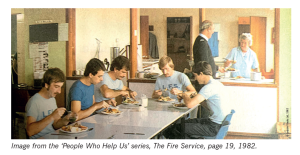
Retired Firefighter, Loughborough Fire Station
“Between 1954 and 2017 me, my dad and my two brothers served 113 years as Firefighters. My dad was Deputy Chief Fire Officer for Leicestershire. I am actually in this Fire Service book and I vividly remember the pictures being taken in Loughborough Fire Station where I worked.
Looking back, the types of incidents themselves have changed because the industries which caused the big fires in Mills and Hosiery factories are not there anymore. Houses are fitted with domestic smoke alarms but back then they were not invented. There is an emphasis much more on fire prevention and community safety now. The balance of the work has changed. When I joined, the fire tunics were made of wool. Our plastic over-trousers kept you dry but if were caught in a flashover they would weld to you.
The Fire Service was exclusively male except for the control room but thankfully that has changed. The workforce was also very white male orientated but now its much more reflective of Leicestershire communities.
I had the most wonderful career with incredible job satisfaction. I am so proud of the extraordinary achievements of my friends and colleagues who are brave and wonderful people. It’s great to be able to bring the past to life for my grandchildren through this book.” © Ladybird Books Ltd, 1982
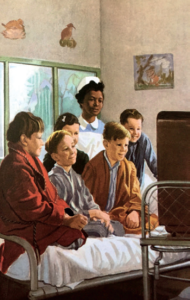
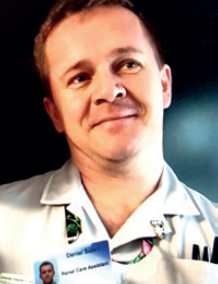
Daniel Sularz
Nurse
“I’m a Nurse here in Loughborough and work in the renal department. Originally I come from Poland and as a child never encountered Ladybird Books. Looking today in England at older editions such as “The Nurse” I can definitely see images from my childhood. I come from the town of Rabka-Zdrój. It lies in the mountains and is on the list of Polish cities that help in the treatment of children with cystic fibrosis, lung problems and other ailments. So as a child, I was surrounded by images of doctors, nurses, children’s wards and laboratories. Even my mother was a laboratory technician and worked with a microscope. Books had a huge impact on my career choices. I decided to save human lives and become a nurse. When you are suffering you just need people to be on that journey with you. I believe people all over the world who do the job of a nurse have this in their souls.”

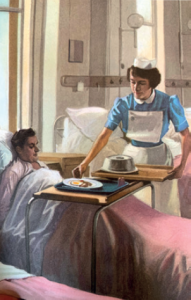
Dominic Purnell
Advanced Clinical Practitioner, Leicestershire
“Nursing over the years has changed significantly since the publication of the Ladybird Books, but the essence of what nurses provide to their patients remains a relative constant; being an advocate for our patients and acting in their best interests.
The first line within the book (“The nurses are always busy”) also remains a constant, but unfortunately there is less time to help with breakfast, wash patients, make hot drinks and arrange flowers as more time is needed in assessing, planning, and implementing a whole range of care to meet the holistic needs of our patients. That is not to say that these aspects are not important areas of personal care that nurses can and often do get involved with, but that there is a wider ‘nursing team’ that also have this responsibility.
Ward routine, length of hospital stay, medical equipment and advances within wider healthcare mean that the patient experience and the demands placed upon nurses are vastly different in modern day practice. This is not least reflected in the change in uniform that nurses have experienced over the years as long gone are the times of apron, cloak, and cap – frilly or otherwise! Trousers and tunic are common-place within many areas of nursing, but also scrubs are a popular choice in many specific locations such as Emergency Departments, urgent care areas, surgical wards and areas such as endoscopy units.
The ability for nurses to develop their careers in a variety of ways has meant that we remain integral to health care and its wider systems. My current role is as an Advanced Clinical Practitioner which means I work with a variety of clinical colleagues in a blended workforce but have a greater ability to direct and influence the care of the patients who come to see me. This role did not exist at the time of the Ladybird Books and is a relatively new area of nursing comparatively.”
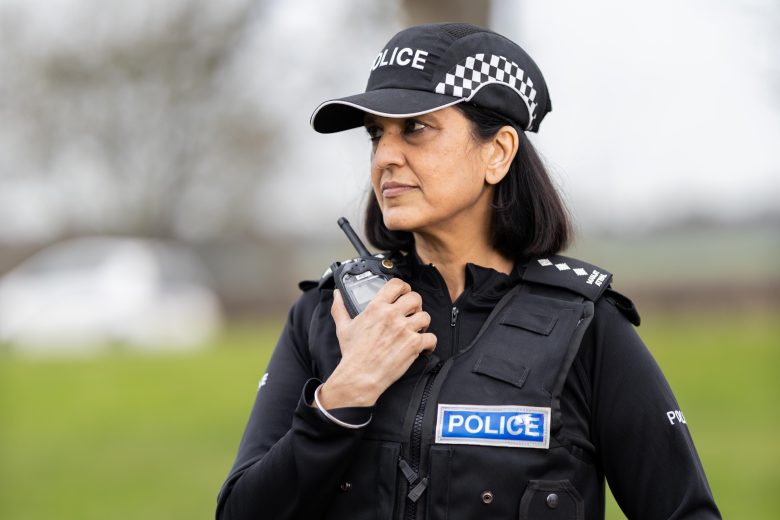
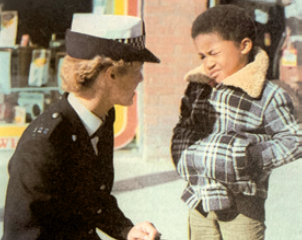
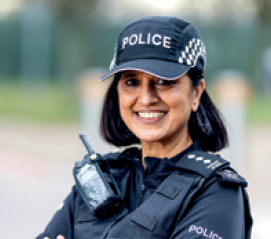
Superintendent Manjit Atwal QPM
Leicestershire Police
Seconded to CoP (College of Policing) Delivery Lead – National Violence Against Women And Girls Task Force,
Chair of the Sikh Police Association and member of the Women’s Inclusive Network
“I remember reading Ladybird Books as a child. They are iconic. A lot has obviously changed. For example, we don’t carry pocket books anymore but use a digital pocket book, there are no red telephone boxes to call us from, but we continue to receive 999 calls and have the 101 for non-urgent calls as well as encouraging online reporting. We don’t dress in tunics to do our day to day work. Handheld radios are more sophisticated which means we can work nationally and link with other services such as the other emergency services. What has stayed the same is the genuine difference police officers make in our communities, building trust, confidence and bringing offenders to justice. This is why I was so passionate about wanting to be a police officer. I’m really pleased this element of the job shines through in the images Ladybird have used.
A significant change from when the books were written is that today 32% of police are women, including a number of female Chief Constables. The moment I knew I wanted to be part of this change was when I was in a market with my Mum and I saw an Asian female police officer for the first time. There were very few from a minoritised community in Policing so seeing an Asian female really inspired me. Seeing someone who looked like me proved it was possible for me to become a police officer which was the best career decision I ever could have made.”
Queen’s Police Medal (QPM)
Manjit was awarded a Queen’s Police Medal (QPM) in the birthday honours list in 2020. She was nominated for being a “role model” and “truly inspiring officer in policing.
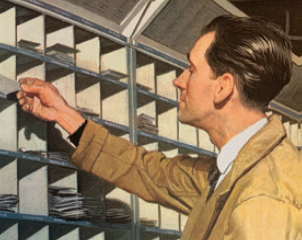
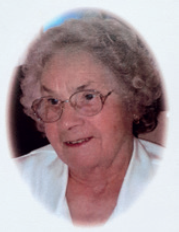
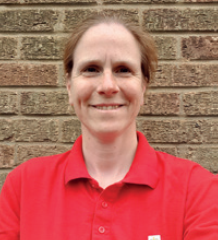

Postwoman, Leicestershire Postal Service, Rachel Revitt
“As a child of the 80’s, I loved Ladybird Books. They were our version of the internet.
Looking through these books, working for the postal service looks like a very male dominated occupation when they were printed. My grandma was a Post-Lady back in the 1980’s and I feel like she’s not being represented at all here but maybe that was the start of the service being more diverse. In our office at Shepshed today there are 12 men and 8 women.
The business has changed a lot over the years. The focus is not solely on delivering letters anymore. We now deliver large volumes of parcels which are increasing year on year. To this day it’s still called a ‘walk’ as the majority of what we do is still delivered on foot. The bikes have been replaced by vans or large trolleys, so we can carry a lot more. We also now carry handheld computers so that we can scan parcels and take photos of items we’re delivering so that they can all be tracked and traced.
What does make me smile is to think that we still have sorting frames, as not all mail that arrives is sorted into walks. Some of the mail is still hand sorted just as these images show.
I do have one question, where are the shorts?”
© Ladybird Books Ltd, 1965
